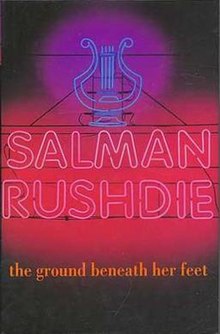The Ground Beneath Her Feet

First edition (UK)
|
|
| Author | Salman Rushdie |
|---|---|
| Country | United Kingdom |
| Language | English |
| Published | April 1999 Jonathan Cape (UK) Henry Holt & Company (US) |
| Media type | Print (hardback & paperback) |
| Pages | 592 pp |
| ISBN | |
| OCLC | 39796091 |
| 823/.914 21 | |
| LC Class | PR6068.U757 G76 1999 |
The Ground Beneath Her Feet is Salman Rushdie's sixth novel. Published in 1999, it is a variation on the Orpheus/Eurydice myth with rock music replacing Orpheus' lyre. The myth works as a red thread from which the author sometimes strays, but to which he attaches an endless series of references.
The book, while at its core detailing the love of two men, Ormus Cama and Umeed "Rai" Merchant (the narrator of the story), for the same woman, Vina Apsara, provides a background and alternate history to the entire 1950s–1990s period of the growth of rock music. The minor characters of the story are particularly interesting, as they provide the most vivid portraits of the cultures and backgrounds that come into play in the story. Defined by Toni Morrison as "a global novel", the book sets itself in the wide frame of Western and post-colonial culture, through the multilingualism of its characters, the mixture of East and West and the great number of references that span from Greek mythology, European philosophy and contemporaries such as Milan Kundera and the stars of rock'n roll.
The title is taken from a song from the novel, composed by Ormus Cama after Vina's death. The lyrics to the song, with minor changes, were adapted and recorded by U2. The song was used in the film The Million Dollar Hotel, and the promotional music video featured Rushdie in a cameo appearance.
The novel is set in a fictional world parallel to ours, but Rushdie does not reveal that until the second half of the book. Thus, there are several untrue historic "facts" used in setting of the novel. In the novel, American president John F. Kennedy survives the Dallas assassination but is shot alongside his brother Robert Kennedy later on; the Watergate scandal is represented as a novel starring a fictional president Richard Nixon. Rushdie also deliberately miscredits some classic rock songs, such as The Rolling Stones' "(I Can't Get No) Satisfaction", which he credits to John Lennon, or Roy Orbison's "Pretty Woman" which he credits to The Kinks. The character named Jesse Garon Parker represents Elvis Presley in every way, while The Who are presented under their original name The High Numbers. In his description of the contribution of Vina's voice to the duet, he compares it to that of Guinevere Garfunkel to Carly Simon's Bridge over Troubled Waters, where the names of the singers hint at Art Garfunkel and Paul Simon.
...
Wikipedia
